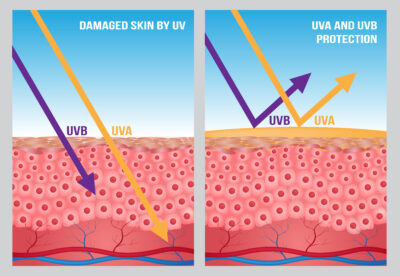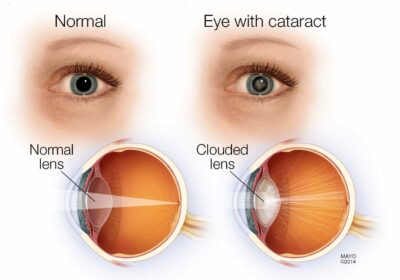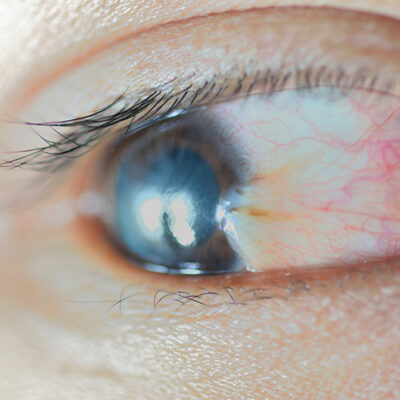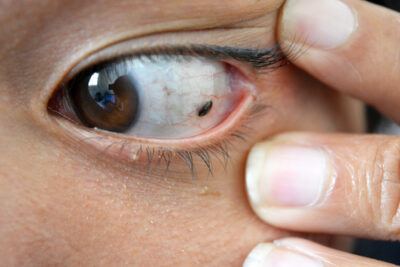For those of us that are lucky enough to live in Honolulu, part of the appeal comes from having the great outdoors all around. Whether it’s surfing at Sandy Beach in its legendary crystal clear water, dining on the terrace at Plumeria Beach House, or just enjoying a warm summer day, being outside is a big reason why people love Honolulu and never want to leave!
But have you ever thought about what all that time spent in the sun is doing to your vision? Keep reading to learn 4 ways that UV light impacts your vision!
What is UV light?
Like many things, if you want to understand how UV light impacts your vision, you first need to know what UV light is! To put it simply, UV light is electromagnetic radiation that comes from the sun.
This is transmitted in particles or waves at different frequencies and wavelengths. Ultraviolet or UV light falls into three subcategories:

- UVA
- UVB
- UVC
Of these subcategories of UV light, 95% is UVA and 5% is UVB. UVC cannot reach the Earth’s surface because the ozone in the upper atmosphere absorbs the shortest UV wavelengths.
When you receive a suntan, this a reaction to the sun’s harmful UVB rays. Tanning occurs as a result of the body’s natural defense mechanisms.
When you tan, a pigment called melanin gets produced. Melanin absorbs UV light and then dissipates it as heat. This is why if you tan or burn your skin, it will feel hot.
The pigment from the melanin is what causes the skin to appear “tan”. Continuing to tan can lead to a sunburn, which happens when UV rays damage the DNA in your body’s cells.
Due to the sunburn, your body floods the area with blood to kickstart the healing process. This may also result in painful inflammation.
1. Early development of cataracts

You may think that cataracts only develop as a result of aging, but that’s not always true. If you spend a lot of time in the sun, you are more likely to develop cataracts early on.
Although there is no way to guarantee you’ll never develop cataracts, heightened exposure to UV light can lead to earlier cataract development. If you want to spend time in the sun while protecting your eyes, invest in a good pair of sunglasses.
They should provide 100% protection from UVA and UVB rays. This information should be easy to find on the UV rating, usually on the back of the sunglasses.
Remember that UV rays from the sun are not blocked by clouds, so you’ll need to protect your eyes on cloudy days as well. You should also make it a habit to schedule regular eye exams with your eye doctor. If you do have a cataract, this is the only way to have one diagnosed.
2. Surfer’s eye or pterygium

Another common issue you may run into if you spend a lot of time in the sun is surfer’s eye or a pterygium. A pterygium is a small, non-cancerous growth that forms on the layer of the conjunctiva over the white of the eyeball.
If you are outside regularly, you are more likely to develop a pterygium. Treatment of a pterygium is not always necessary.
In more severe cases, surgery may be the best course of action, especially if the growth is starting to impede vision. Even if you have a pterygium removed, there is a high recurrence rate.
It’s important to protect your eyes whenever you’re outside by wearing UV-blocking sunglasses to reduce your chance of developing a pterygium or having one recur.
3. Photokeratitis or a corneal sunburn

Protecting your eyes from the sun’s rays should always be a priority when you’re outside. Those that don’t are at risk of developing photokeratitis, also known as corneal sunburn or “snow blindness”.
This condition occurs as a result of too much high exposure to UV rays. This can be because of the sun reflecting off the sand, ice, snow, and water.
You can also develop photokeratitis if you stare straight at the sun without using a special device to filter the sun’s rays. Photokeratitis is like having a sunburn but in your eye.
If you want to enjoy the warmth of the sun while you take part in outdoor activities, wear proper eye protection! This should include a pair of sunglasses that will protect your eyes from UVA and UVB rays.
You should also consider wearing a wide-brimmed hat with your sunglasses for the most protection. This may be necessary if you know you’ll be outside when the sun is strongest, which is midday to early afternoon. It’s also stronger at higher altitudes and whenever it’s reflected off ice, snow, or water.
4. Skin cancer that develops in or around your eyelids

Think that tan you got at the beach looks good? Think again! Tanning is one of the easiest ways to develop skin cancers due to direct exposure to UV rays.
The most common kinds of skin cancer are basal cell and squamous cell cancers. They are often found on sun-exposed parts of the body.
The risk of melanoma, which is the most prevalent kind of cancer that involves the eyes, increases with prolonged UV exposure. If you’re not protecting your eyes when you’re outside, you run a high risk of developing skin cancer either in or around your eyelids.
In severe cases of melanoma, the eyeball must be surgically removed. Want to avoid this? Protect your eyes! Look for sunglasses that meet the following qualifications:
- They should block out 99-100% of both UVA and UVB radiation
- They should screen out 75-90% of any visible light
- The lenses should match in color and not be distorted or have any imperfections
- Lenses should be gray for proper color recognition. Lenses that are too dark will actually cause more harm than good to your eyes.
If you spend a lot of time outdoors, you may want to consider investing in a pair of wraparound sunglasses, which will provide you with the most protection possible from the sun’s rays.
Concerned that your eyes are burned out because of too much time in the sun? Schedule an appointment at Sugiki Portis Yim Eye Center today to find out how we can help!





